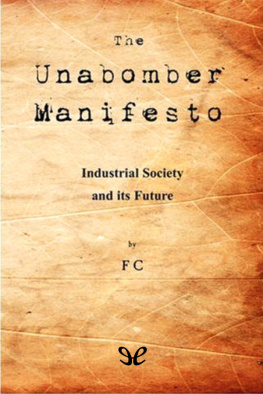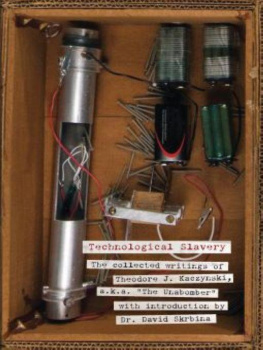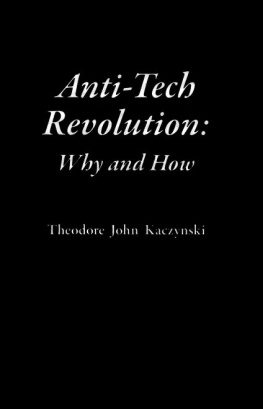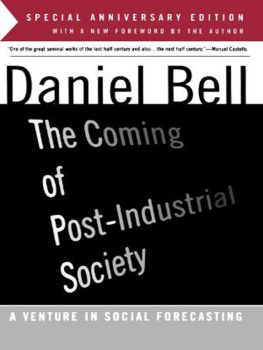Theodore J. Kaczynski - Industrial Society and Its Future
Here you can read online Theodore J. Kaczynski - Industrial Society and Its Future full text of the book (entire story) in english for free. Download pdf and epub, get meaning, cover and reviews about this ebook. year: 1995, publisher: ePubLibre, genre: Politics. Description of the work, (preface) as well as reviews are available. Best literature library LitArk.com created for fans of good reading and offers a wide selection of genres:
Romance novel
Science fiction
Adventure
Detective
Science
History
Home and family
Prose
Art
Politics
Computer
Non-fiction
Religion
Business
Children
Humor
Choose a favorite category and find really read worthwhile books. Enjoy immersion in the world of imagination, feel the emotions of the characters or learn something new for yourself, make an fascinating discovery.
- Book:Industrial Society and Its Future
- Author:
- Publisher:ePubLibre
- Genre:
- Year:1995
- Rating:5 / 5
- Favourites:Add to favourites
- Your mark:
- 100
- 1
- 2
- 3
- 4
- 5
Industrial Society and Its Future: summary, description and annotation
We offer to read an annotation, description, summary or preface (depends on what the author of the book "Industrial Society and Its Future" wrote himself). If you haven't found the necessary information about the book — write in the comments, we will try to find it.
Industrial Society and Its Future — read online for free the complete book (whole text) full work
Below is the text of the book, divided by pages. System saving the place of the last page read, allows you to conveniently read the book "Industrial Society and Its Future" online for free, without having to search again every time where you left off. Put a bookmark, and you can go to the page where you finished reading at any time.
Font size:
Interval:
Bookmark:

The Industrial Revolution and its consequences have been a disaster for the human race. They have greatly increased the life-expectancy of those of us who live in advanced countries, but they have destabilized society, have made life unfulfilling, have subjected human beings to indignities, have led to widespread psychological suffering (in the Third World to physical suffering as well) and have inflicted severe damage on the natural world. The continued development of technology will worsen the situation. It will certainly subject human beings to greater indignities and inflict greater damage on the natural world, it will probably lead to greater social disruption and psychological suffering, and it may lead to increased physical suffering even in advanced countries.

Theodore J. Kaczynski
The Unabomber Manifesto
ePub r1.0
Titivillus 18.02.18
Theodore J. Kaczynski, 1995
Editor digital: Titivillus
ePub base r1.2


THEODORE JOHN KACZYNSKI (born May 22, 1942), also known as the Unabomber, is an American mathematician, anarchist and domestic terrorist. A mathematical prodigy, he abandoned an academic career in 1969 to pursue a primitive lifestyle, then between 1978 and 1995 killed 3 people, and injured 23 others, in a nationwide bombing campaign targeting those involved with modern technology. In conjunction, he issued a social critique opposing industrialization and advancing a nature-centered form of anarchism.
Raised in Evergreen Park, Illinois, Kaczynski was a child prodigy and entered Harvard College at the age of 16. He earned his BA from Harvard in 1962, then his MA and PhD in mathematics from the University of Michigan in 1964 and 1967, respectively. After receiving his doctorate at age 25, he became an assistant professor at the University of California, Berkeley, but resigned abruptly two years later. As an undergraduate at Harvard, Kaczynski was a research subject in an ethically questionable experiment conducted by psychology professor Henry Murray, which some analysts have claimed influenced Kaczynski's later actions.
In 1971, Kaczynski moved to a remote cabin without electricity or running water in Lincoln, Montana, where he lived as a recluse while learning survival skills in an attempt to become self-sufficient. In 1978, after witnessing the destruction of the wildland surrounding his cabin, he concluded that living in nature was untenable and began his bombing campaign. In 1995, he sent a letter to The New York Times and promised to desist from terrorism if the Times or The Washington Post published his manifesto, Industrial Society and Its Future, in which he argued that his bombings were extreme but necessary to attract attention to the erosion of human freedom and dignity by modern technologies that require large-scale organization.
Kaczynski was the target of the Federal Bureau of Investigation's (FBI's) longest and costliest investigation. Before his identity was known, the FBI used the acronym UNABOM (UNiversity and Airline BOMber) to refer to his case, which resulted in the media calling him the Unabomber. The FBI, as well as Attorney General Janet Reno, pushed for the publication of Industrial Society and Its Future, which led to his brother, David Kaczynski, recognizing his style of writing and beliefs and tipping off the FBI. After his arrest in 1996, Kaczynski tried unsuccessfully to dismiss his court-appointed lawyers because they wanted to plead insanity in order to avoid the death penalty, as he did not believe he was insane. In 1998 a plea bargain was reached, under which he pleaded guilty to all charges and was sentenced to life in prison without the possibility of parole.
1. The Industrial Revolution and its consequences have been a disaster for the human race. They have greatly increased the life expectancy of those of us who live in advanced countries, but they have destabilized society, have made life unfulfilling, have subjected human beings to indignities, have led to widespread psychological suffering (in the Third World to physical suffering as well) and have inflicted severe damage on the natural world. The continued development of technology will worsen the situation. It will certainly subject human beings to greater indignities and inflict greater damage on the natural world, it will probably lead to greater social disruption and psychological suffering, and it may lead to increased physical suffering even in advanced countries.
2. The industrial-technological system may survive or it may break down. If it survives, it MAY eventually achieve a low level of physical and psychological suffering, but only after passing through a long and very painful period of adjustment and only at the cost of permanently reducing human beings and many other living organisms to engineered products and mere cogs in the social machine. Furthermore, if the system survives, the consequences will be inevitable: There is no way of reforming or modifying the system so as to prevent it from depriving people of dignity and autonomy.
3. If the system breaks down the consequences will still be very painful But the bigger the system grows the more disastrous the results of its breakdown will be, so if it is to break down it had best break down sooner rather than later.
4. We therefore advocate a revolution against the industrial system. This revolution may or may not make use of violence; it may be sudden or it may be a relatively gradual process spanning a few decades. We cant predict any of that. But we do outline in a very general way the measures that those who hate the industrial system should take in order to prepare the way for a revolution against that form of society. This is not to be a POLITICAL revolution. Its object will be to overthrow not governments but the economic and technological basis of the present society.
5. In this article we give attention to only some of the negative developments that have grown out of the industrial-technological system. Other such developments we mention only briefly or ignore altogether. This does not mean that we regard these other developments as unimportant. For practical reasons we have to confine our discussion to areas that have received insufficient public attention or in which we have something new to say. For example, since there are well-developed environmental and wilderness movements, we have written very little about environmental degradation or the destruction of wild nature, even though we consider these to be highly important.
of Modern Leftism
6. Almost everyone will agree that we live in a deeply troubled society. One of the most widespread manifestations of the craziness of our world is leftism, so a discussion of the psychology of leftism can serve as an introduction to the discussion of the problems of modern society in general.
7. But what is leftism? During the first half of the 20th century leftism could have been practically identified with socialism. Today the movement is fragmented and it is not clear who can properly be called a leftist. When we speak of leftists in this article we have in mind mainly socialists, collectivists, politically correct types, feminists, gay and disability activists, animal rights activists and the like. But not everyone who is associated with one of these movements is a leftist. What we are trying to get at in discussing leftism is not so much a movement or an ideology as a psychological type, or rather a collection of related types. Thus, what we mean by leftism will emerge more clearly in the course of our discussion of leftist psychology. (Also, see paragraphs 227-230).
Font size:
Interval:
Bookmark:
Similar books «Industrial Society and Its Future»
Look at similar books to Industrial Society and Its Future. We have selected literature similar in name and meaning in the hope of providing readers with more options to find new, interesting, not yet read works.
Discussion, reviews of the book Industrial Society and Its Future and just readers' own opinions. Leave your comments, write what you think about the work, its meaning or the main characters. Specify what exactly you liked and what you didn't like, and why you think so.












